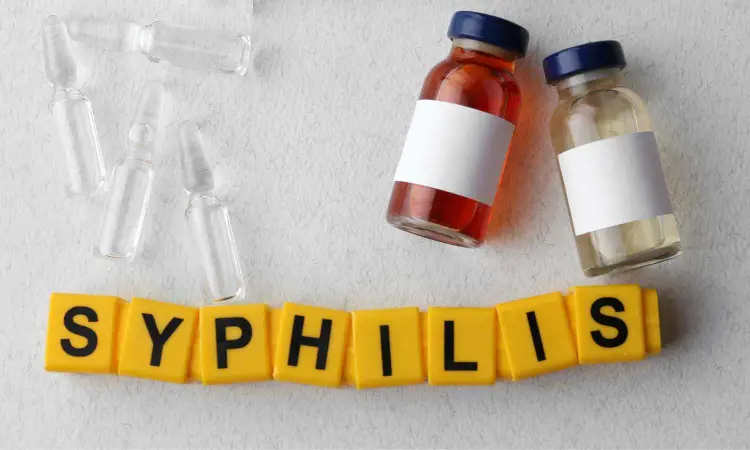- Home
- Medical news & Guidelines
- Anesthesiology
- Cardiology and CTVS
- Critical Care
- Dentistry
- Dermatology
- Diabetes and Endocrinology
- ENT
- Gastroenterology
- Medicine
- Nephrology
- Neurology
- Obstretics-Gynaecology
- Oncology
- Ophthalmology
- Orthopaedics
- Pediatrics-Neonatology
- Psychiatry
- Pulmonology
- Radiology
- Surgery
- Urology
- Laboratory Medicine
- Diet
- Nursing
- Paramedical
- Physiotherapy
- Health news
- Fact Check
- Bone Health Fact Check
- Brain Health Fact Check
- Cancer Related Fact Check
- Child Care Fact Check
- Dental and oral health fact check
- Diabetes and metabolic health fact check
- Diet and Nutrition Fact Check
- Eye and ENT Care Fact Check
- Fitness fact check
- Gut health fact check
- Heart health fact check
- Kidney health fact check
- Medical education fact check
- Men's health fact check
- Respiratory fact check
- Skin and hair care fact check
- Vaccine and Immunization fact check
- Women's health fact check
- AYUSH
- State News
- Andaman and Nicobar Islands
- Andhra Pradesh
- Arunachal Pradesh
- Assam
- Bihar
- Chandigarh
- Chattisgarh
- Dadra and Nagar Haveli
- Daman and Diu
- Delhi
- Goa
- Gujarat
- Haryana
- Himachal Pradesh
- Jammu & Kashmir
- Jharkhand
- Karnataka
- Kerala
- Ladakh
- Lakshadweep
- Madhya Pradesh
- Maharashtra
- Manipur
- Meghalaya
- Mizoram
- Nagaland
- Odisha
- Puducherry
- Punjab
- Rajasthan
- Sikkim
- Tamil Nadu
- Telangana
- Tripura
- Uttar Pradesh
- Uttrakhand
- West Bengal
- Medical Education
- Industry
One injection of benzathine penicillin G treats early syphilis as well as three doses: NEJM

Researchers funded by the National Institutes of Health (NIH) have found that a single injection of the antibiotic benzathine penicillin G (BPG) successfully treated early syphilis just as well as the three-injection regimen used by many clinicians in the United States and elsewhere. These findings from a late-stage clinical trial suggest the second and third doses of conventional BPG therapy do not provide a health benefit. The results were published today in The New England Journal of Medicine.
“Benzathine penicillin G is highly effective against syphilis, but the three-dose regimen can be burdensome and deter people from attending follow-up visits with their healthcare providers,” said Carolyn Deal, Ph.D., chief of the enteric and sexually transmitted infections branch of NIH’s National Institute of Allergy and Infectious Diseases (NIAID). “The new findings offer welcome evidence for potentially simplifying treatment with an equally effective one-dose regimen, particularly while syphilis rates remain alarmingly high.”
Syphilis is a common sexually transmitted infection (STI) caused by the bacterium Treponema pallidum. The United States reported 209,253 total syphilis cases and 3,882 congenital syphilis cases in 2023, representing 61% and 108% increases over 2019 numbers, respectively. Without treatment, syphilis can result in neurological and organ damage as well as severe pregnancy complications and congenital abnormalities. Syphilis can also increase a person’s likelihood of acquiring or transmitting HIV.
BPG is one of the few antibiotics known to effectively treat syphilis, and stockouts are common worldwide. The antibiotic is currently being imported to the United States to resolve a nationwide shortage.
The study was conducted at ten U.S. sites and enrolled 249 participants with early syphilis, which encompasses the primary, secondary, and early latent stages of disease. Sixty-one percent of participants were living with HIV and 97% were men. The participants were randomly assigned to receive either a single intramuscular (IM) injection of BPG 2.4 million units (MU) or a series of three IM injections of BPG 2.4 MU at weekly intervals. All participants were monitored for safety. Biological markers of successful treatment in the blood—known as the serologic response to therapy-were examined at six months following treatment.
Seventy-six percent of participants in the single-dose group had a serologic response to treatment compared to 70% of participants in the three-dose group. The difference between groups was not statistically significant, even when participants were stratified by HIV status. One participant developed signs of neurosyphilis three days after starting BPG therapy and was excluded from the analysis. Three serious adverse events were reported but were not related to BPG.
“Syphilis has been studied and treated for more than a century, and BPG has been in use for more than 50 years, yet we are still acquiring knowledge to help us optimize treatment,” said Principal Investigator Edward W. Hook III, M.D., emeritus professor of medicine and epidemiology at the University of Alabama at Birmingham. “We hope these promising results will be complemented by scientific advances in syphilis prevention and diagnosis.”
According to the study authors, the results from this trial provide substantial evidence that single-dose BPG 2.4 MU is as effective as three doses in treating early syphilis. More research is needed to understand the full potential of this abbreviated treatment strategy and to evaluate therapeutic approaches for all stages of syphilis, including late syphilis, latent syphilis of unknown duration, and clinical neurosyphilis.
Reference:
Edward W. Hook III, Jodie A. Dionne, One Dose versus Three Doses of Benzathine Penicillin G in Early Syphilis, New England Journal of Medicine, DOI: 10.1056/NEJMoa2401802
Dr Kamal Kant Kohli-MBBS, DTCD- a chest specialist with more than 30 years of practice and a flair for writing clinical articles, Dr Kamal Kant Kohli joined Medical Dialogues as a Chief Editor of Medical News. Besides writing articles, as an editor, he proofreads and verifies all the medical content published on Medical Dialogues including those coming from journals, studies,medical conferences,guidelines etc. Email: drkohli@medicaldialogues.in. Contact no. 011-43720751


